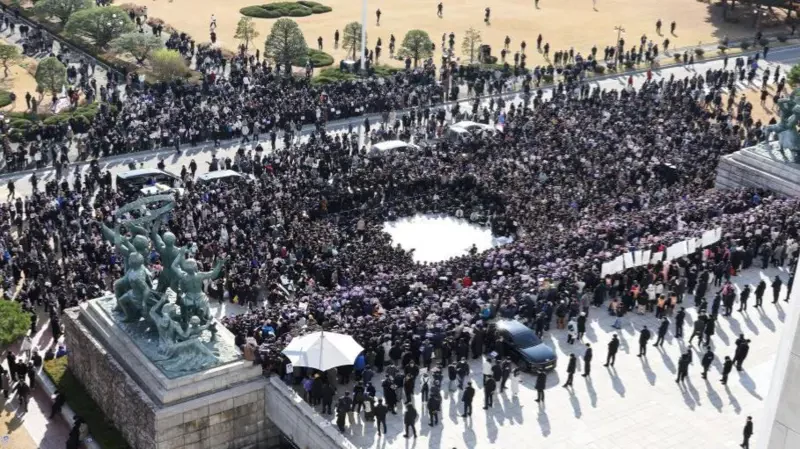South Korea turmoil: what next?
 File
File
SEOUL, December 8 — South Korea's main opposition plans a new push to impeach President Yoon Suk Yeol after he briefly imposed martial law and sent troops and helicopters to parliament.
AFP looks at how the dramatic events of the past week unfolded in a country where democracy had been assumed to be firmly anchored -- and what might happen next.
What did Yoon do?
Yoon announced late Tuesday in an address to the nation that martial law was being imposed, for the first time in South Korea in more than four decades. The suspension of civilian rule was to protect from "threats posed by North Korea's communist forces and to eliminate anti-state elements plundering people's freedom and happiness," Yoon said. A decree from army chief General Park An-su banned political activities and parties, "false propaganda", strikes and "gatherings that incite social unrest".
What happened at parliament?
Security forces sealed the National Assembly, helicopters landed on the roof and soldiers tried to lock down the building. But as parliamentary staffers blocked the soldiers with sofas and fire extinguishers, enough MPs got inside to vote down Yoon's move. This brought cheers from the thousands of protesters braving bitter temperatures outside, many waving national flags and chanting for Yoon to be arrested. Several tense hours followed before Yoon appeared on television again at around 4:30 am Wednesday (1930 GMT Tuesday) to rescind martial law.
What happened with the impeachment motion?
Lawmakers voted on Saturday evening on a motion to impeach Yoon as huge crowds braved bitter weather conditions to rally outside calling for Yoon to go. The opposition bloc hold 192 seats in the 300-member parliament, so the motion needed only eight defections from Yoon's People Power Party (PPP) for the necessary two-thirds majority. PPP leader Han Dong-hoon said Korea was in "great danger" if Yoon remained but the party decided it would still block the impeachment motion. In the end, all PPP members left the chamber with only three returning to cast ballots, and the vote was declared null and void because it lacked a quorum.
Why did the PPP do this?
The PPP said that it had "effectively obtained (Yoon's) promise to step down" in exchange for blocking his impeachment. The PPP promised the president would hand over governance to the party and prime minister. But the opposition cried foul, calling the move illegal. "The power of the president is not the personal property of President Yoon Suk Yeol," said Lee Jae-myung, leader of the main opposition Democratic Party. "Isn't this another coup that destroys the constitutional order?" Lee announced that the party would try again to impeach Yoon on December 14. It is unclear whether this will have any more chance of succeeding. More protests are expected too.
What about the investigation?
Police are investigating Yoon and others for "insurrection", a crime not covered by presidential immunity and which can carry the death penalty. On Sunday police arrested Kim Yong-hyun, defence minister at the time of the martial law fiasco who already resigned and was given a travel ban. Interior Minister Lee Sang-min, who is also being investigated, on Sunday resigned.
Lawmakers have been grilling other senior figures, including army chief of staff General Park, who acted as Yoon's martial law commander. The head of South Korean special forces said he had been ordered to "drag out" lawmakers from parliament. A purported arrest list included opposition leader Lee, National Assembly Speaker Woo Won-shik, and PPP leader Han.









Leave Comment